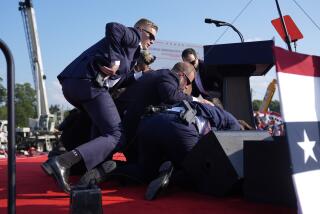Senators Revise Bill to Shield the Media
Senators began a new effort to pass a media shield law Thursday, reintroducing legislation they said would protect journalists from being sent to jail for refusing to reveal their sources in most cases.
The bill, rewritten with guidance from more than 30 news organizations, drew new support after changes that could force reporters to disclose sources if they witnessed a crime or obtained information deemed secret by law.
“There has been a deadlock on improving the shield law for the very reason that not all disclosures by government officials to members of the press are equal,” said Sen. Charles E. Schumer (D-N.Y.), announcing he was supporting the bill for the first time.
“We need to protect the press, especially with a big, large government that keeps things secret more and more,” Schumer added. “We also have to have some respect for the fact that there are certain things that shouldn’t be made public by statute.”
Some lawmakers remained skeptical about shielding reporters in wartime.
Sen. Jeff Sessions (R-Ala.), said he was chilled by the journalism awards this year for reporters who revealed the CIA’s use of secret prisons overseas and the National Security Agency’s warrantless monitoring of phone calls and e-mails into and out of the U.S.
“If a spy comes into our country and gets secure information and gives it to our enemy, we prosecute them and put them in jail,” Sessions said. “But if a reporter gets information and publishes it to our enemies and to the whole world, they get the Pulitzer Prize.”
Aware that the previous version had little hope of becoming law, Senate authors Richard G. Lugar (R-Ind.), and Arlen Specter (R-Pa.), added exceptions they said were modeled on Justice Department guidelines.
One would require reporters who are eyewitnesses to crimes to disclose the information. Others would remove the shield if disclosure is critical to preventing death or bodily harm.
Journalists or their employers also would be required to disclose information needed to prevent an act of terrorism or harm to national security.
The exception for national security requires a court to apply a balancing test in which “the value of the information that would be disclosed clearly outweighs the harm to the public interest and the free flow of information that would be caused by compelling the disclosure.”
The legislation more tightly defines “journalist” by excluding writers who do not provide regular news coverage, such as occasional Internet bloggers.
More to Read
Sign up for Essential California
The most important California stories and recommendations in your inbox every morning.
You may occasionally receive promotional content from the Los Angeles Times.









